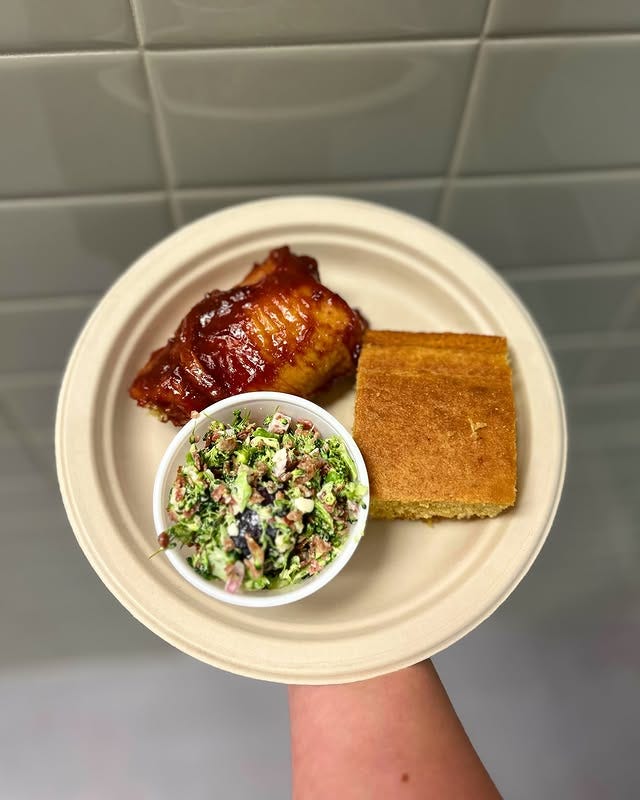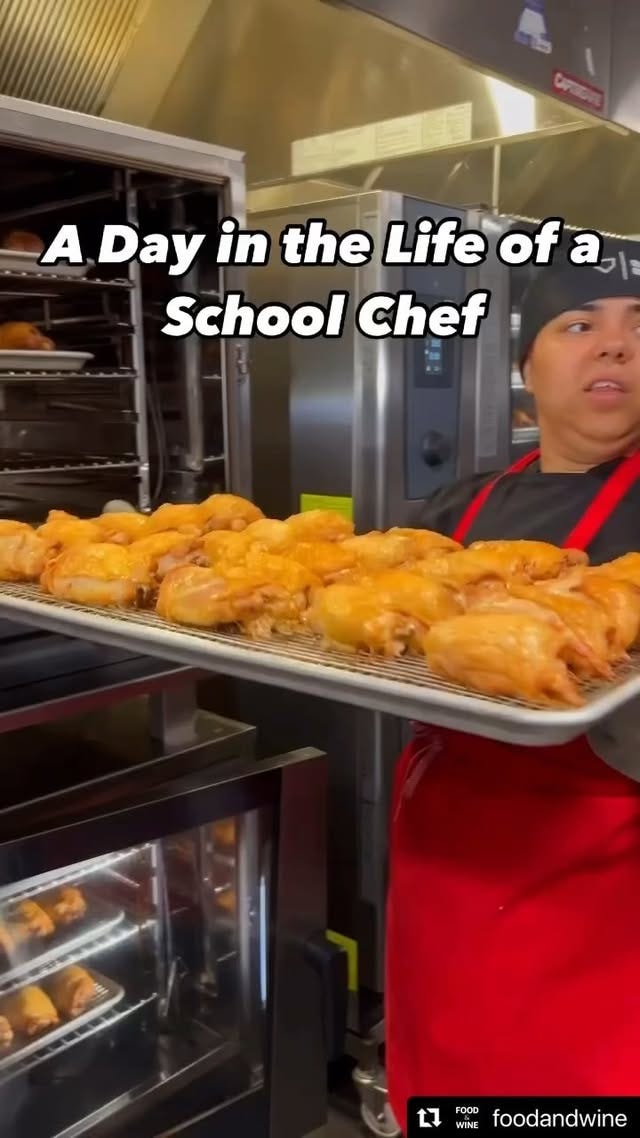Make American Hungry & Grim Again?
New definitions of waste and fraud = anything that benefits the vulnerable
I wasn't planning to write about America again so soon after chronicling the dismantling of the USAID and the swift descent into authoritarianism. I also think we (the rest of the world) are often too captivated by what’s happening in America at the expense of everywhere else.
Unfortunately, I can’t ignore the latest developments on food, agricultural and environmental policies, especially when they are so petty and disproportionately harmful to vulnerable communities.
The fact that I can play on the MAGA and MAHA slogans helps, although I must credit IPES-Food for the inspiration. It also gives me a chance to re-up an old interview with someone whose work on school meals I really admire.
Apologies in advance for any typos. I’m in throes of a never-ending life admin that is taking up a lot of headspace.
Making America Hungry Again
The U.S. Department for Agriculture (USDA), “has axed two programs that gave schools and food banks money to buy food from local farms and ranchers, halting more than $1 billion in federal spending,” Politico reported on Monday, Mar 10. What timing: the International School Meals Day came three days later.
Existing agreements will go ahead but a new round of funding has been nixed since these programmes “no longer effectuate the goals of the agency”, the news outlet quoted a USDA spokesperson as saying.
Multiple news outlets also quoted the agency as saying it will be “marking a return to long-term, fiscally responsible initiatives”, implying that feeding children and buying from local food producers are both short-sighted and financially reckless.
“These proposals would cause millions of children to lose access to free school meals at a time when working families are struggling with rising food costs,” Shannon Gleave, the president of the School Nutrition Association, a nonprofit that represents 50,000 school lunch personnel, said a statement.
Of course, food prices are expected to rise even further with Trump’s tariffs. There is plenty of irony to be found in a rich man who campaigned on bringing down inflation (egg prices, anyone?) actually worsening the situation but I’m too infuriated to find it.
According to The Washington Post, seven swing states that won Trump the 2024 presidential election are losing nearly $178 million in local food that would have gone on schoolchildren’s plates.
The move will also likely lead to the shuttering of local businesses and farmers, said WaPo. Like Greenbrier Dairy, run by Trey Yates, a 27-year-old fourth-generation dairy farmer in West Virginia. He employs 10 people, including formerly incarcerated folks recovering from drug addiction.
You’d think school meals are a no-brainer. There’s enough research out there showing hungry kids can’t concentrate and well-nourished citizens of any age pay dividends by boosting a country’s productivity and lowering health costs.
A systematic review of 47 studies also found that most studies that examined universal free school meals, including free lunch, “found positive associations with diet quality, food security, and academic performance”.
Whether for altruistic or self-interested reasons, there are good ones to keep school meals going so I really don’t have the vocabulary to describe how craven this move is.
It also runs counter to the Make America Healthy Again (MAHA) movement that has been credited with helping to elect Trump and recent statements from MAHA champion, vaccine-denier-in-chief, and U.S. Secretary of Health and Human Services Robert F. Kennedy Jr. who has blamed the measles outbreak in Texas on bad diets.
Perhaps MAHA is really about Make Only the Rich Americans Healthy Again? Or will school meals emerge as an initiative under the Food and Drug Administration (FDA), even though it is under the purview of USDA? See Helena’s FoodFix piece.
Who knows? I guess inducing uncertainty, anxiety and fear is precisely the point.
Making America Grim Again
A day after announcing cutting the school meal programmes, The New York Times reported that another federal agency signalled its intention to do away with offices “designed to ease the heavy pollution faced by poor and minority communities”.
In an internal memo, Lee Zeldin, administrator of the Environmental Protection Agency (EPA), said it is eliminating the offices of environmental justice at all 10 EPA regional offices as well as the one in Washington.
This is an office that was established in 1992 to “address the disproportionately adverse human health and environmental impacts in overburdened communities”.
Its three-decade-plus work is supported by ample research that confirms Americans who live near power plants, highways and the like have higher rates of asthma, heart disease and many other health problems, said Friends of the Earth.
These include residents of so-called Cancer Alley, those without access to clean drinking water, and people in air pollution hotspots.
Why are they being shut down? See screenshots from the NYT piece below.
Again, I am failing to find the words to describe the wilful destruction at the heart of these decisions.
What kind of people see the need to protect vulnerable communities from pollution as ideological? The kind that don’t see poor and minority groups as humans, I’m assuming.
This was just one of the many announcements undoing some of the most significant environmental regulations in the U.S., which, ultimately, will also affect every single one of us. It has also terminated climate grants worth $20 billion.
From Noma’s Kitchen to School Canteens
I first spoke to and wrote about Dan Giusti nearly six years ago. Dan is former head chef at Noma, the famed Danish kitchen that was voted one of the world's best restaurants and pioneered the “New Nordic” cuisine.
After three years working at the highest level of haute cuisine, Dan took a left field turn. He set up Brigaid to serve tasty and healthy food to thousands of schoolchildren in the U.S., working with a budget of about $1.50 a meal.
I spoke to him again at the end of 2022 for another story and also published a Thin Ink issue based on that conversation. Given the topic this week, I’m reposting the interview in full. I’ve made slight adjustments to reflect the passing of time and added new photos. The original piece is here.
Thin: Dan, the last time we spoke (in 2019), you said hunger was the most pressing concern at the schools you worked at. Is that still the case (in 2022)?
Dan: Yeah, I mean, the name of the game with school food is first and foremost, you really are addressing hunger. A lot of kids are dependent on school meals. Period.
That's the thing you always have to keep in mind, coupled with the fact that you have a set budget. So if it comes to using compostable wares… that means we're spending a little more money on forks and knives versus plastic, and that money comes away from the quality of chicken that we're using.
I think there are a lot of organisations within this space for whom everything is about nutrition. Can you address hunger simultaneously with nutrition? Yes. And is that what our goal is all the time? Yes. But there are times when you have to kind of prioritise addressing hunger over nutrition. You don't want to do that.
A prime example is cold breakfast cereal. Kids really like their sugary, not high-quality breakfast cereals whose brands they recognise. There are kids who, if they come to school and (those cereals are) an option, they will eat breakfast. If not, there are kids who will choose not to eat. In my opinion, it's better they eat something. This is kind of an unpopular opinion.
Obviously, over time, the better we get in terms of preparing food within constraints and the budgets, we can do both simultaneously. In some of the places we've been for the longest we've gotten to a point where we can really focus on things beyond the food.
For example in New London where we started, we are thinking, “OK, are we using reusable wares? Or compostable?” When you start in this space, you want to try to tackle all these things because that's the values you have. But you can't do it all at once.
Thin: Are public officials buying more into your ethos of making school meals good and healthy and if possible, cooking from scratch?
Dan: Yes and no. I think the problem is when you say, “We want to tackle the basics, and we want to be practical”, some of these things are not the sexiest things.
If you're a politician and you have four years to prove yourself, you wanted it to be bells and whistles like (cooking from scratch) all the time. But a lot of these changes, especially in the large systems, take some time.
I'll be really honest with you. We don't use a PR company anymore, not because they didn't do their job but because it was just that what people want to hear about this work is not necessarily the story that is important to me. That story that's important to me is that we're doing the best service to the school districts.
It is actually very exciting if you really pay attention… like the implications that school district feeding programmes could have on sustainability and environment is actually ridiculous. It's crazy how big of an impact.
But people just want that clickbait, “Oh, great meals for a dollar twenty-five.” So I've kind of put my head down to a certain extent and focused on getting into school districts. They're happy. We're excited to work with them. That's the most important thing.
Thin: I love the picture of kale chips you tweeted (in 2022). Where was that taken and what did the students think?
Dan: That's in New London. (The students) love them. I would say cooked green vegetables are definitely the most challenging for us to serve successfully outside of basically kale chips and properly cooked broccoli.
If you were writing a restaurant menu and there's broccoli on everything, people will be like, “This is boring.” Well, if we put broccoli on three or four dishes over the course of a month in a school and the kids love it every time? It's a win.
Thin: I guess it’s about training them to eat more diverse foods, right?
Dan: That's for sure. But in my experience, we're not in a position, in our educational system, to really make that happen in a very robust, consistent way. I would say our focus is really introducing kids to the foods and if the foods are prepared well, kids will enjoy them and I think that's a huge win.
It's funny because I think fine dining is absolutely the worst in terms of (this)… Basically the more money you pay, the more people just kind of like buy into things and don't even pay attention to what's happening.
From the kitchen to the dining room, it’s like, “This was produced this way and this way and locally”, and everyone's like, “Wow” and eats it. Everyone’s caught up. I remember when I was at Noma, if we had a table of like six adults, not one of them will say, “I don't really like this” because if you don’t, it's almost like, “You don't get it.”
It's very different in a school. No one cares. If it's good, then they might be like, “Oh, what is this?” Then you have that “in” to talk about it. It can be really difficult at times because people are very honest. But when you break through, you know it's real.
Thin: Anything else you’d like to add?
Dan: When we talk about school meals, we serve breakfast, lunch, and there's usually a snack involved somewhere in there. Also, if you participate in after-school activities, there’s a supper. That's a lot of food that can be provided to a student for free.
And if school food is good, it can have a lot of benefits.. Like introducing kids to new foods. This is the perfect place to do it.
Also, just because a kid comes from a household that they might not be dependent on the school meals doesn't mean they're eating well. They could be eating terribly or they might not be eating breakfast. How does this affect the way they learn? How does this affect their health?
School Meal programmes in general address hunger, but beyond that, if they're done well, they address a lot of things like proper nutrition, increasing kids ability to learn. Anyone who wants to criticise school food programmes, they have to understand the challenges.
You know, during COVID people were like, “Oh, school food workers. They're heroes.” But I've just been talking to a bunch of folks that run school food programmes and they're back to the bottom of the barrel. They don't get any priority. It's a real shame. It's just everything else is more important.
In institutions, whether it's a school, a prison, or a hospital, food is like a secondary function and it's treated that way. And it shouldn't be. Not at all.
Thin’s Pickings
Thin on Myanmar: food systems, religion, journalism, humanitarian aid & more
Self-promo alert!
Here’s a long podcast (140 minutes!!!) on Insight Myanmar where I rambled on about lots of issues, including the ones not mentioned above.
I also spoke about the “polycrisis” Myanmar is in for a panel organised by The New Humanitarian a couple of weeks ago and you can view the recording here.
Microplastics Are Messing with Photosynthesis in Plants - Scientific American
Joanna Thompson reports on a new study showing how microplastics can reduce photosynthesis in plants, including in crucial food crops.
“With the current rates of worldwide plastic production… farmers could see a 4 to 13.5 percent yield loss per year in staple crops such as corn, rice and wheat over the next 25 years,” she wrote.
Op-ed: The Food System Cannot Become Another Fossil-Fuel Industry Escape Hatch - Civil Eats
Anna Lappé writes about the linkages between fossil fuels, ultraprocessed foods, and food systems emissions, the challenge of talking about it when emissions are invisible, and why we must tackle them regardless.
She referred to the work her organisation has done, including helping to produce the podcast Fuel to Fork, which I’ve written about.
What Everyone Gets Wrong About Unions - Boss Barista
Ashley Rodriguez, who writes about everything associated with coffee, makes a full-throated defence on the need for unions, especially for low-wage workers.
“Amidst the active threat of weakening labour laws, we need to lead with the idea that unions are simply allowed to exist. They do not need a specific justification, and aren’t only meant to respond to work conditions we view as undesirable.”
U.N. humanitarian affairs chief issues warning about U.S. funding cuts - The Washington Post
Cuts by donors, especially the U.S., will mean the U.N. may not be able to help two out of three people who desperately need humanitarian aid this year, Karen DeYoung wrote, quoting Tom Fletcher, the U.N. undersecretary of humanitarian affairs and emergency relief coordinator.
*An aside: I’ll be recommending fewer stories from WaPo. I’ve cancelled my subscription in light of recent editorial policy decisions by its owner, the warehouse mogul, and will be losing access soon.*
As US pulls back, Southeast Asia is left in crisis - Thibi
Of course one of the places that have been hit hard by the funding cuts is Myanmar. This helpful data story provides a vivid illustration of what is being lost by Trump’s cuts in Southeast Asia in general and Myanmar in particular.
As always, please feel free to share this post and send tips and thoughts on bluesky @thinink.bsky.social, mastodon @ThinInk@journa.host, my LinkedIn page, twitter @thinink, or via e-mail thin@thin-ink.net.











Thin, thank you as always for your essential journalism during this time of considerable uncertainty. I'm currently living in this dystopian nightmare in a very progressive and expensive city (New York ) and cannot fathom how others in more rural areas are being able to afford or handle any of these changes. None of these policies make sense or benefit anyone except the ultra wealthy.